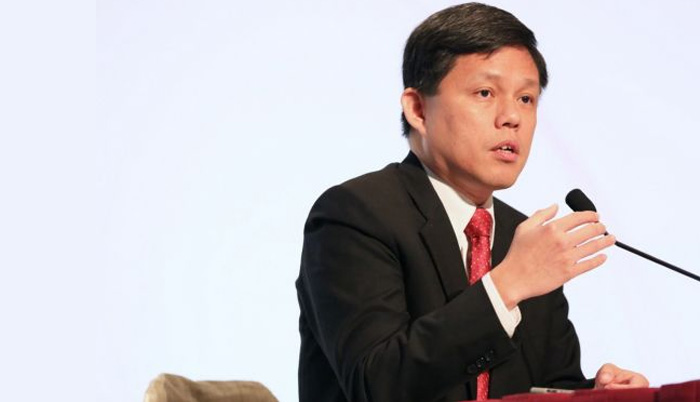![]() Home > Singapore
Home > Singapore
Budget Is About Securing S’pore’s Collective Future, Says Chun Sing

Mr Chan Chun Sing. TODAY file photo
![]() March 2nd, 2017 | 10:55 AM |
March 2nd, 2017 | 10:55 AM | ![]() 1601 views
1601 views
SINGAPORE
For many individuals and businesses, the Budget was about “how much do I get?”, but there is much more at stake than just increasing government spending to take care of individual short-term pain, said Minister in the Prime Minister’s Office Chan Chun Sing yesterday.
Rather, the Budget must be about Singapore’s “collective future”, said Mr Chan, as he dismissed talk that the Budget this year is a “political” one that has ignored the short-term needs of businesses and individuals.
Mr Chan was one of 34 members of the House who spoke on the second day of the Budget debate, during which Members of Parliament also spoke of the need for better protection for workers amid shifting job trends, and more help for society’s vulnerable groups. The water tariffs hike was also again discussed, with two ministers — Mr Chan and Environment and Water Resources Minister Masagos Zulkifli — defending the move.
Delivering his speech, Mr Chan said: “Many have asked if the Budget can be a bit more generous, if the Government can spend a bit more. But let us take a look at our Budget position carefully.”
The Republic, he said, is “living on the income of our savings”. This year’s budget of about S$70 billion is in part propped up by about S$14 billion in Net Investment Returns derived from the reserves — the biggest of the Government’s top four revenue streams.
Noting this was not the case a few years ago, Mr Chan said the Government’s revenue streams depend on the status of the world economy, and the question is whether this is sustainable.
Politicians will speak up for those to need more, but political leaders, he said, must face the issue squarely — how to distribute finite resources. Questioning if Government should be apologetic for helping those who need more help, Mr Chan said: “It means that some of us who are more privileged will have to foot the bigger bill. Is that the right thing to do? I think so.”
He also refuted the suggestion that this year’s Budget was a “wait and see” one — a term used by Workers’ Party Non-Constituency Member of Parliament Daniel Goh on Tuesday during the debate.
Said Mr Chan: “If this is a wait-and-see budget, we won’t have to put in place the mechanisms for carbon pricing, we won’t have to talk about diesel tax, we won’t have to talk abt water tax. If this is a political budget, we won’t have to talk about any of this.”
It takes courage and “political leadership” to tell people to aspire to a higher goal, “beyond what’s in it for me”, he said.
To prepare for the long-term changes, Mr Chan, who also secretary-general of the National Trades Union Congress (NTUC), said that the priority now is on jobs — an issue raised by several MPs yesterday.
Some noted the rise of the gig economy and the need for more support for them, such as mandatory medical benefits. Others wanted more to be done for disadvantaged workers and schemes that better match workers to available jobs, with Mr Patrick Tay (West Coast GRC) pointing out that the number of job vacancies mean nothing to workers who still cannot find work.
Mr Chan said the labour movement will work with businesses and Institutes of Higher Learning to strengthen the overall job placement system, by integrating back-end systems so that workers receive help no matter which career centre they go to. It is even prepared to work with agencies such as LinkedIn, he added.
NTUC, together with other agencies, will also look into the new forms of employment such as freelancers and contract workers, as well as protections for this group.
Weighing in on the water price hikes, Mr Chan said that the “intense discussion” so far indicates that it has been left out of “our national psyche for too long”, and the authorities need to do more to “socialise our people to the challenges we are facing on the water front”.
While he understood the angst felt by some, water is “existential”. Singapore now has 17 reservoirs and two-thirds of Singapore’s entire land is made up of water catchment areas.
Technology has helped Singapore meet some of its water demand, but its people still need to be prudent in using the resource. “How many more desalination plants and NEWater plants must we build in order for water to never be a weapon pointing at our head?” he said.
He also warned that water needs of people in the southern Malaysian state are increasing, and Malaysia is also extracting water upstream of Linggiu Reservoir — which Singapore depends on to draw water reliably from the Johor River.
“That affects our yield but we want to and we are committed to work with the Malaysian and Johor government, the Johor authorities to see how we can develop the water system for both the benefit of Malaysia and Singapore,” he said. ADDITIONAL REPORTING BY SIAU MING EN
Source:
courtesy of TODAY
by TAN WEIZHEN
If you have any stories or news that you would like to share with the global online community, please feel free to share it with us by contacting us directly at [email protected]